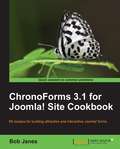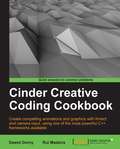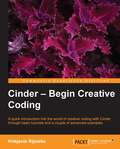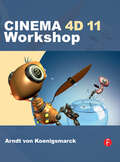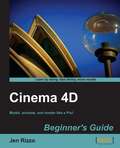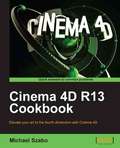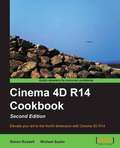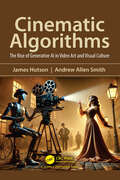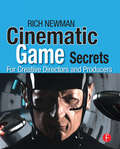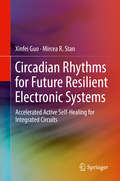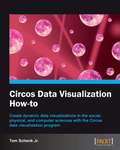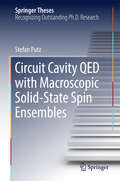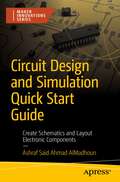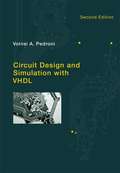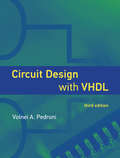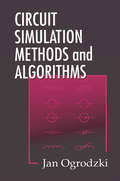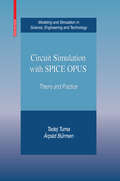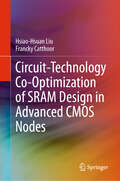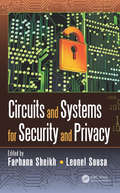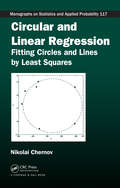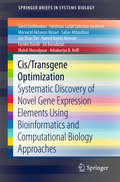- Table View
- List View
ChronoForms 3.1 for Joomla! site Cookbook
by Bob JanesThis book is the missing manual for creating forms on your Joomla! site. Using simple examples that you can easily follow we will show you how you can create forms of almost any kind. Most of the chapters focus on one topic starting with simple recipes for new users and then adding new features that add more to the form but may also require more knowledge and experience to implement.Other chapters look in more detail at adding special features, or creating forms to perform particular tasks. Again the recipes range from those that a new user can easily implement to those that will help more advanced developers.Each recipe is kept as simple as possible and set out so that it can be easily implemented with the code supplied; and the recipes are also a set of building blocks that you can use to create much more complex forms using several recipes to build your form.As far as space allows we have explained how the code works, what features of Joomla or of ChronoForms we are using and we've offered suggestions in the 'There's more . . .' sections for ways in which the basic recipe can be extended or adapted.The code examples are complete and can be adapted by new users with the minimum of customization or they can be as a starting point for developers with more coding experience to build on and adapt to create fully customized form applications. This is a practical hands-on book for people who want to add forms to their Joomla! site. Whether you just want to add a simple newsletter sign-up form or a complex multi-page interactive form you'll find helpful suggestions and recipes that will get your forms working. Many recipes will work 'out-of-the-box' using ChronoForms built-in capabilities; other more advanced recipes require some knowledge of Joomla!, HTML, CSS ,PHP, MySQL or JavaScript. There is working code with each recipe that you can adapt to meet your specific needs.
Cinder Creative Coding Cookbook
by Rui Madeira Dawid GornyFull of easy-to-follow recipes and images that will teach powerful techniques and algorithms, building from basic projects to challenging applications. This book is for artists, designers, and programmers who have previous knowledge of C++, but not necessarily of Cinder.
Cinder – Begin Creative Coding
by Krisjanis RijnieksPresented in an easy to follow, tutorial-style format, this book will lead you step-by-step through the multi-faceted uses of Cinder."Cinder: Begin Creative Coding" is for people who already have experience in programming. It can serve as a transition from a previous background in Processing, Java in general, JavaScript, openFrameworks, C++ in general or ActionScript to the framework covered in this book, namely Cinder. If you like quick and easy to follow tutorials that will let yousee progress in less than an hour - this book is for you. If you are searching for a book that will explain algorithms for complex 2D and 3D generative animations and use of advanced C++ and / or Open GL features - it is not.
Cinema 4D 11 Workshop
by Arndt von KoenigsmarckModel, texture and animate with Cinema 4D 11 using the techniques and tips provided in Cinema 4D 11 Workshop. Starting with all of the basic concepts, functions, and tools - follow along to the workshop tutorials that deliver a hands-on knowledge of the new R11 toolset as well as the returning advanced features. The companion website provides all of the required tutorial media from the projects in the book so that you create your own working models and animations.
Cinema 4D Beginner's Guide
by Jen RizzoStep-by-step instructions with guiding screenshots will help new users to create a photorealistic interior scene with an animated camera. Users will also learn how to use the MoGraph module to create dynamic motion graphics, how to link parameters with Xpresso (Cinema 4D's node-based programming language), and are guided through mini-projects to explore additional tools for non-photorealistic illustrations, hair creation and cloth rendering. Designers and artists with a basic proficiency in animation or computer graphics, as well as professionals who are familiar with other 3D animation software.
Cinema 4D R13 Cookbook
by Michael SzaboThis book contains short recipes designed to effectively teach tools in the minimum amount of time. Each recipe hits on a topic that can be combined or incorporated with other recipes to give you the building blocks you need to start making great designs with Cinema 4D. Rather than demonstrating how to make a few specific and extensive projects, the recipes create a solid base of knowledge to help the reader understand the tools available to foster their own creativity. This book is for anyone who wants to quickly get up to speed with Cinema 4D to create 3D projects that run laps around simple 2D designs.
Cinema 4D R14 Cookbook
by Michael Szabo Simon RussellThis book is written in a Cookbook style with short recipes designed to effectively teach tools in the minimum amount of time. Each recipe hits on a topic that can be combined or incorporated with other recipes to give you the building blocks you need to start making great designs with Cinema 4D. Rather than demonstrating how to make a few specific and extensive projects, the recipes create a solid base of knowledge to help the reader understand the tools available to foster their own creativity.This book is for professional artists working in architecture, design, production, or games and wanting to use Cinema 4D to create amazing 3D graphics. It is for anyone who wants to quickly get up to speed with Cinema 4D to create 3D projects that run laps around simple 2D designs.
Cinema Taiwan: Politics, Popularity and State of the Arts
by Darrell William Davis Ru-Shou Robert ChenFollowing the recent success of Taiwanese film directors, such as Hou Hsiao-hsien, Edward Yang, Ang Lee and Tsai Ming-liang, Taiwanese film is raising its profile in contemporary cinema. This collection presents an exciting and ambitious foray into the cultural politics of contemporary Taiwan film that goes beyond the auterist mode, the nation-state argument and vestiges of the New Cinema. Cinema Taiwan considers the complex problems of popularity, conflicts between transnational capital and local practice, non-fiction and independent filmmaking as emerging modes of address, and new possibilities of forging vibrant film cultures embedded in national (identity) politics, gender/sexuality and community activism. Insightful and challenging, the essays in this collection will attract attention to a globally significant field of cultural production and will appeal to readers from the areas of film studies, cultural studies and Chinese culture and society.
Cinematic Algorithms: The Rise of Generative AI in Video Art and Visual Culture
by Andrew Smith James HutsonThis book explores the groundbreaking integration of generative artificial intelligence into filmmaking and visual storytelling. From democratizing video production to reshaping aesthetics, this book highlights the creative revolution AI offers. Through case studies, interviews with innovative artists, and historical perspectives, it examines how intelligent systems enhance creativity while challenging traditional notions of authorship and originality. With practical guides and forward-looking insights, this volume is essential for anyone curious about the intersection of technology and visual culture, offering a vivid portrait of the future of storytelling in an AI-driven world.
Cinematic Appeals: The Experience of New Movie Technologies (Film and Culture Series)
by Ariel RogersCinematic Appeals follows the effect of technological innovation on the cinema experience, specifically the introduction of widescreen and stereoscopic 3D systems in the 1950s, the rise of digital cinema in the 1990s, and the transition to digital 3D since 2005. Widescreen cinema promised to draw the viewer into the world of the screen, enabling larger-than-life close-ups of already larger-than-life actors. This technology fostered the illusion of physically entering a film, enhancing the semblance of realism. Alternatively, the digital era was less concerned with the viewer's physical response and more with information flow, awe, and the reevaluation of spatiality and embodiment. This study ultimately shows how cinematic technology and the human experience shape and respond to each other over time.
Cinematic Game Secrets for Creative Directors and Producers: Inspired Techniques From Industry Legends
by Rich NewmanCinematography for Games covers the space between the game and film industries by pointing out the most relevant cinematic techniques in today's hottest games, and including interviews with the game industry's greatest luminaries (including Will Wright: Sims legend, Harvey Smith, legendary game Deus Ex, Warren Spector creator of one of the original game companies, Origin).The convergence of games and film is a widely discussed and debated topic in the game industry. Many major publishers, along with some high-profile directors (John Woo, James Cameron, Steven Spielberg, Tony Scott) are exploring the middle ground between the industries. This book introduces game producers and directors to the tried and true techniques cinematographers have relied on for years.Game developers learn how to create compelling video games by: developing quality stories and characters; visualizing scenes within the game through the eyes of a cinematographer; using tried and true film industry methods for casting, voice-over, direction, and production.The book will also feature screen shots from some of today's hottest titles that illustrate key cinematic concepts, as well as advice from successful game industry professionals already using these techniques.
Circadian Rhythms for Future Resilient Electronic Systems: Accelerated Active Self-Healing for Integrated Circuits
by Xinfei Guo Mircea R. StanThis book describes methods to address wearout/aging degradations in electronic chips and systems, caused by several physical mechanisms at the device level. The authors introduce a novel technique called accelerated active self-healing, which fixes wearout issues by enabling accelerated recovery. Coverage includes recovery theory, experimental results, implementations and applications, across multiple nodes ranging from planar, FD-SOI to FinFET, based on both foundry provided models and predictive models. Presents novel techniques, tested with experiments on real hardware;Discusses circuit and system level wearout recovery implementations, many of these designs are portable and friendly to the standard design flow;Provides circuit-architecture-system infrastructures that enable the accelerated self-healing for future resilient systems;Discusses wearout issues at both transistor and interconnect level, providing solutions that apply to both;Includes coverage of resilient aspects of emerging applications such as IoT.
Circos Data Visualization How-to
by Tom SchenkRecipes that follow a problem-solution approach. It's a friendly, hands-on guide to creating visualizations with step-by-step instructions. This book is targeted at statisticians, analysts, and graphic designers with an interest in data visualization. The author does not presume any experience with Circos and steps through the installation and diagram creation process.
Circuit Cavity QED with Macroscopic Solid-State Spin Ensembles (Springer Theses)
by Stefan PutzThis thesis combines quantum electrical engineering with electron spin resonance, with an emphasis on unraveling emerging collective spin phenomena. The presented experiments, with first demonstrations of the cavity protection effect, spectral hole burning and bistability in microwave photonics, cover new ground in the field of hybrid quantum systems. The thesis starts at a basic level, explaining the nature of collective effects in great detail. It develops the concept of Dicke states spin-by-spin, and introduces it to circuit quantum electrodynamics (QED), applying it to a strongly coupled hybrid quantum system studied in a broad regime of several different scenarios. It also provides experimental demonstrations including strong coupling, Rabi oscillations, nonlinear dynamics, the cavity protection effect, spectral hole burning, amplitude bistability and spin echo spectroscopy.
Circuit Design and Simulation Quick Start Guide: Create Schematics and Layout Electronic Components (Maker Innovations Series)
by Ashraf Said AlMadhounOpen up the exciting world of electronics with 3D circuit designing tools and create your own fresh new projects. With this quick guide you’ll use high-quality graphical programs to create, modify, and update circuits in an interactive, virtual environment that can also be used in the real world. Follow along with the tutorials and get the chance to play with electronics safely before getting your hands dirty. In just a few minutes, you’ll start creating your first circuit. You’ll focus more on how the components layout together than on worrying about design to get started. Watch as different electronic components receive different signals and test them in different situations and circuit conditions first before moving on to real-life testing. When you’re ready, you’ll work with real breadboards and microcontrollers, such as the Arduino, to bring your simulated circuits and projects to life. Once you have your circuit put together, work with basic Arduino programming to give it purpose and make it respond to your commands. By the end of the book you'll have mastered the basics of both circuit design and programming. What You'll LearnEngineer electrical equipment for little to no costMeasure different electrical signals, such as voltage, temperature, light, and moreProgram Arduinos to work with your new circuitsWho This Book Is ForStudents and hobbyists interested in electrical engineering and programming who want to dive into experimentation virtually before working with real-world circuits.
Circuit Design with VHDL
by Volnei A. PedroniThis textbook teaches VHDL using system examples combined with programmable logic and supported by laboratory exercises. While other textbooks concentrate only on language features, Circuit Design with VHDL offers a fully integrated presentation of VHDL and design concepts by including a large number of complete design examples, illustrative circuit diagrams, a review of fundamental design concepts, fully explained solutions, and simulation results. The text presents the information concisely yet completely, discussing in detail all indispensable features of the VHDL synthesis. The book is organized in a clear progression, with the first part covering the circuit level, treating foundations of VHDL and fundamental coding, and the second part covering the system level (units that might be located in a library for code sharing, reuse, and partitioning), expanding upon the earlier chapters to discuss system coding.
Circuit Design with VHDL, third edition (The\mit Press Ser.)
by Volnei A. PedroniA completely updated and expanded comprehensive treatment of VHDL and its applications to the design and simulation of real, industry-standard circuits.This comprehensive treatment of VHDL and its applications to the design and simulation of real, industry-standard circuits has been completely updated and expanded for the third edition. New features include all VHDL-2008 constructs, an extensive review of digital circuits, RTL analysis, and an unequaled collection of VHDL examples and exercises. The book focuses on the use of VHDL rather than solely on the language, with an emphasis on design examples and laboratory exercises.The third edition begins with a detailed review of digital circuits (combinatorial, sequential, state machines, and FPGAs), thus providing a self-contained single reference for the teaching of digital circuit design with VHDL. In its coverage of VHDL-2008, it makes a clear distinction between VHDL for synthesis and VHDL for simulation. The text offers complete VHDL codes in examples as well as simulation results and comments. The significantly expanded examples and exercises include many not previously published, with multiple physical demonstrations meant to inspire and motivate students. The book is suitable for undergraduate and graduate students in VHDL and digital circuit design, and can be used as a professional reference for VHDL practitioners. It can also serve as a text for digital VLSI in-house or academic courses.
Circuit Simulation Methods and Algorithms (Electronic Engineering Systems #4)
by Jan OgrodzkiCircuit Simulation Methods and Algorithms provides a step-by-step theoretical consideration of methods, techniques, and algorithms in an easy-to-understand format. Many illustrations explain more difficult problems and present instructive circuits. The book works on three levels:The simulator-user level for practitioners and students who want to better understand circuit simulators. The basic theoretical level, with examples, dedicated to students and beginning researchers. The thorough level for deep insight into circuit simulation based on computer experiments using PSPICE and OPTIMA. Only basic mathematical knowledge, such as matrix algebra, derivatives, and integrals, is presumed.
Circuit Simulation with SPICE OPUS: Theory and Practice (Modeling and Simulation in Science, Engineering and Technology)
by Tadej Tuma Árpád BuermenThis book is a unique combination of a basic guide to general analog circuit simulation and a SPICE OPUS software manual, which may be used as a textbook or self-study reference. The book is divided into three parts: mathematical theory of circuit analysis, a crash course on SPICE OPUS, and a complete SPICE OPUS reference guide. All simulations as well as the free simulator software may be directly downloaded from the SPICE OPUS homepage: www.spiceopus.si. Circuit Simulation with SPICE OPUS is intended for a wide audience of undergraduate and graduate students, researchers, and practitioners in electrical and systems engineering, circuit design, and simulation development.
Circuit-Technology Co-Optimization of SRAM Design in Advanced CMOS Nodes
by Francky Catthoor Hsiao-Hsuan LiuModern computing engines—CPUs, GPUs, and NPUs—require extensive SRAM for cache designs, driven by the increasing demand for higher density, performance, and energy efficiency. This book delves into two primary areas within ultra-scaled technology nodes: (1) advancing SRAM bitcell scaling and (2) exploring innovative subarray designs to enhance power-performance-area (PPA) metrics across technology nodes. The first part of the book utilizes a bottom-up design-technology co-optimization (DTCO) approach, employing a dedicated PPA simulation framework to evaluate and identify the most promising strategies for SRAM bitcell scaling. It offers a comprehensive examination of SRAM bitcell scaling beyond 1 nm node, outlining a structured research cycle that includes identifying scaling bottlenecks, developing cutting-edge architectures with complementary field-effect transistor (CFET) technology, and addressing challenges such as process integration and routing complexities. Additionally, this book introduces a novel write margin methodology to better address the risks of write failures in resistance-dominated nodes. This methodology accounts for time-dependent parasitic bitline effects and incorporates timing setup of write-assist techniques to prevent underestimating the yield loss. In the second part, the focus shifts to a top-down DTCO approach due to the diminishing returns of bitcell scaling beyond 5 Å node at the macro level. As technology scales, increasing resistance and capacitance (RC) lead designers to adopt smaller subarray sizes to reduce effective RC and enhance subarray-level PPA. However, this approach can result in increased inter-subarray interconnect overhead, potentially offsetting macro-level improvements. This book examines the effects of various subarray sizes on macro-level PPA and finds that larger subarrays can significantly reduce interconnect overhead and improve the energy-delay-area product (EDAP) of SRAM macro. The introduction of the active interconnect (AIC) concept enables the use of larger subarray sizes, while integrating carbon nanotube FET as back-end-of-line compatible devices results in macro-level EDAP improvements of up to 65% when transitioning from standard subarrays to AIC divided subarrays. These findings highlight the future trajectory of SRAM subarray design in deeply scaled nodes.
Circuits and Systems for Security and Privacy (Devices, Circuits, and Systems)
by Farhana Sheikh Leonel SousaCircuits and Systems for Security and Privacy begins by introducing the basic theoretical concepts and arithmetic used in algorithms for security and cryptography, and by reviewing the fundamental building blocks of cryptographic systems. It then analyzes the advantages and disadvantages of real-world implementations that not only optimize power, area, and throughput but also resist side-channel attacks. Merging the perspectives of experts from industry and academia, the book provides valuable insight and necessary background for the design of security-aware circuits and systems as well as efficient accelerators used in security applications.
Circular Business Models in the Manufacturing Industry: Insights from Small Open Economies (Studies in Energy, Resource and Environmental Economics)
by Jurgita Bruneckienė Lina Dagilienė Viktorija Varaniūtė Justina BanionienėThe book takes a multi-level perspective, focusing on circular business models by manufacturing industries in European small open economies. The book conceptualises circular business models and combines theoretical foundations with best practices when such models appeared in the textile, furniture, and plastics industries. It also explores barriers, drivers, challenges, and opportunities for leading manufacturing companies to implement circular activities across the value chain. This book offers a qualitative and transformative approach, spread across three different manufacturing industries, towards a circular transition. The findings will be of interest to practitioners and managers, policymakers, and general readers who are interested in the circular economy and environmental sustainability.
Circular Economy Strategy for SDG Business Management: New Theories and System Techniques
by Young Won Park Kin'ya TamakiThis book delineates the framework to research and develop new theories and system techniques for a circular economy (CE) strategy to fulfill Sustainable Development Goals (SDGs) in the era of digital, sustainable, and green transformation (DX, SX, and GX). For that purpose, five system techniques are presented here: (1) multi-generational and circular economy value chain management (CE-VCM), (2) cyclical resource supply and resource collection, (3) CE product planning and digital marketing, (4) lifecycle design of IoT (Internet of Things) products, and (5) a sharing platform and application software compatible with CE-VCM. The book also explores how to proceed with international trends in research concerning CE policies and standards in Japan, the EU, and the USA. Included are case studies of advanced CE companies in diverse industries, such as automobiles, electronics, food and agriculture, and software, to name just a few. Surveys of trends in CE policy and successful industry case studies in Japan are presented and compared with those in other countries. In the past, the Japanese manufacturing industry was primarily based on the business model of selling off the products introduced into the market and the 3R tactics of &“reuse, reduce, and recycle&” to follow up on waste disposal. Compared to global movements, however, the responses to the CE trend in Japan, the Japanese government's CE policy, and CE management strategy in the Japanese industrial world have lagged considerably behind. In the future, when Japanese companies conduct global business transactions, it will be pivotal for them to implement a CE management strategy compatible with the ISO 59000 series. The Japanese government and global companies must respond to the SDGs, including Goal 12: Producer and Consumer Responsibility. To keep up with external environmental trends, Japanese global firms also must respond to the changes discussed in this informative volume.
Circular and Linear Regression: Fitting Circles and Lines by Least Squares (Chapman & Hall/CRC Monographs on Statistics and Applied Probability)
by Nikolai ChernovFind the right algorithm for your image processing applicationExploring the recent achievements that have occurred since the mid-1990s, Circular and Linear Regression: Fitting Circles and Lines by Least Squares explains how to use modern algorithms to fit geometric contours (circles and circular arcs) to observed data in image processing and comput
Cis/Transgene Optimization: Systematic Discovery Of Novel Gene Expression Elements Using Bioinformatics And Computational Biology Approaches (Springerbriefs In Systems Biology Ser.)
by Saeid Kadkhodaei Farahnaz Sadat Golestan Hashemi Morvarid Akhavan Rezaei Sahar Abbasiliasi Joo Shun Tan Hamid Rajabi Memari Faruku Bande Ali Baradaran Mahdi Moradpour Arbakariya B. AriffThis book is a practical review which focuses on computational analysis and on in silico approaches towards the systematic discovery of various key functional gene expression elements in microalgae as a model. So far, in this regard very little information is available. Efficient stepwise procedures for analysing the matrix attachment regions (MARs) are outlined, as well as for translation initiation sites (TIS), signal peptide (SP) sequences, gene optimization and transformation systems. These outlines can be efficiently deployed as practical models for the systematic discovery of key expression elements and for the optimization of cis/transgenes in other micro/organisms. The first chapter is an introduction on the key gene expression elements analysed in this book, including scaffold/matrix attachment regions, translation initiation sites, signal peptides as well as gene optimization. Chapter 2 focuses on systematic strategies and computational approaches toward in silico analysis of each factor. The analyses outcomes is assessed individually in chapter 3 followed by developing the specific conceptual models for each element in Chapter 4. The concluding remarks are discussed in Chapter 5. This work is of interest to computational and experimental biologists interested in transcriptional regulation analysis as well as to researchers and scientists who wish to consider the use of bioinformatics and computational biology in design, analysis, or regulatory reviews of key gene expression elements for the production of recombinant proteins experiments.
